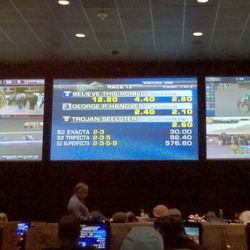A Delaware panel recommended changes to the way slot machine vendor fees are assessed in a decision which would cost the state $9.9 million this fiscal year. If instituted, the changes might cost Delaware taxpayers $20 million per year in future fiscal years.
Delaware casinos face growing competition from casinos in Pennsylvania and Maryland. Because of mounting difficulties, lawmakers in Delaware constituted a study commission to see whether the government could make their gaming industry more competition. The commission’s panel completed their study recently and recommended a 75% split of costs for the slot machine vendors and fees with the state-sanctioned casinos.
At present, all three of Delaware’s casinos pay 100% of the costs. If the panel’s recommendations are taken, they will go into effect on July 1, 2014. Because that would be through part of the fiscal year, the costs to the state would be approximately $9.9 million this year. In future years, the cost would increase.
The slot machine fees are not the only ones the commission suggested ending. It also suggested eliminating a $3 million table game fee which is set to be assessed to the gaming operations starting on July 1, 2015. This $3 million fee is supposed to be paid each year on that date.
Also, the commission suggested that the state of Delaware should lower its percentage of revenue sharing with the casinos, lowering the state’s cut of revenues from 29.4% down to $15%.
New Horse Racing Industry Study Suggested
The panel proposed updating the state’s study of Delaware’s equine industry, which hasn’t been assessed since a 2004 report. Such economic studies determine what kind of economic impact the horse racing industry has on the state, while also determining what impact the current economy has on the industry.
Since the last study took place 10 years ago, it has little bearing on the current conditions inside Delaware. The panel said a new 2014 study would cost about $100,000.
Allocation of $3 Million in Unspent Funds
The panel suggested new uses of the remaining $3 million in funds allocated by last year’s $8 million financial bailout of Delaware’s casinos. The panel believes those funds should be used for economic development initiatives specific to the gambling industry.
Governor Jack Markell Supports Proposals
Governor Jack Markell supports the panel’s recommendations, which are set to be put before the General Assembly for a final vote in the near future. Governor Markell is a supporter of the Delaware gaming industry, having recently completed a deal with the governor of Nevada for an interstate iPoker cooperation. The iPoker compact with Nevada allows the two states to share online player databases, while inviting other states to join in their network.
Panel Voted 7-2 for Recommendations
The commission’s panel voted 7-2 to support the recommendations. The leading member was Brian Bushweller, a Democrat fro Dover, whose district includes the Dover Downs Casino. One of the two panel members who voted against the recommendations was Charles Potter, a state representative from Wilmington.
Alan Levin Votes against Recommendations
State Economic Director Alan Levin, who was also on the panel, voted against the commission’s proposals. Levin said he was concerned about the state’s economic crisis and, having a wider view of the economy, was concerned about the loss in $20.1 million in revenue from the state treasury.
Levin favored certain fee reductions, such as the table game fees, but he was against reducing the slot machine fees, saying the generosity of the proposals is “too rich for us”. Still, the Economic Director did propose changes which would have cost the state $14.1 million, so the differences of opinion appear to be a matter of degrees.
The proposals appear to have substantial support, so it’s expected that the General Assembly will enact measures to boost the state’s troubled gaming industry. Since the three land-based gaming operations have been allowed to accept online poker and casino gamblers in 2012, the number of residents visiting those sites have been disappointing. The recent agreement with Nevada should help boost revenues for the poker websites, but it’s still uncertain how much Delaware will benefit from the changes.
The main question is whether a second initiative will form around Alan Levin’s proposals, which offer 70% of the relief that the panel’s main proposals do. Because the two-year proposal includes nearly $10 million in fiscal year 2014 and $20 million more in fiscal year 2015, some media outlets have referred to the panel’s evaluations as a proposed $30 million bailout.

